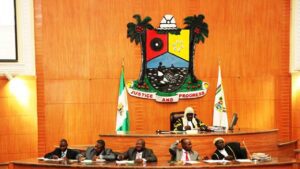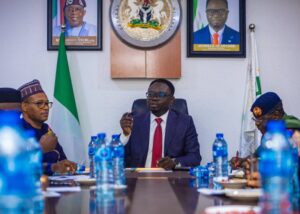
FG advocates synergy to mitigate exploitation, maximise groundwater potential — Minister
The Minister of Water Resources, Mr Suleiman Adamu, says Government and Non-Governmental stakeholders must collaborate to mitigate pressures from exploitation of groundwater and maximise its potential.
Adamu made this call at the 2022 World Water Day and International Women’s Day Commemoration by the Network of Female Professionals in Water, Sanitation and Hygiene (FEMinWASH) on Wednesday in Abuja.
The minister was represented at the occasion by the Permanent Secretary in the ministry, Mrs Esther Walson-Jack.
The event which also was used to inaugurate the Generation T (Transformers) project to empower women and youths in plumbing, had the theme ‘Groundwater: making the invisible visible.’
According to Adamu, all hands must be on deck to recognise groundwater enormous ecological value for the many surface water bodies and wetlands that depend on it.
“We need to acknowledge and mitigate pressures from exploitation, contamination and climate change on groundwater.
“Against this backdrop, there is need for the ministry to collaborate with Non-Governmental Organizations such as FEMinWASH and other stakeholders including the State Water Agencies, River Basins and Development partners.
“To maximize the potential of groundwater use in a sustainable and equitable way in order to make this resource visible.
“Thus the ministry is honored to collaborate with other stakeholders in their capacity building efforts aimed at disadvantaged youths particularly females as well as accredited professional development of the Sector.
“The ministry on its own part will explore opportunities for partnership in line with some of our existing Graduate/Youth Empowerment Programmes, private sector driven operation and maintenance of community water supply infrastructure to complement the programmes being launched today,” Adamu said.
On her part, the permanent secretary, said efforts should be made to consult and engage women in issues pertaining to water.
Walson-Jack said this was necessary because women were the ones who actually use and need water most.
She was represented by Mrs Jumai Idakwo, a staff of the ministry
The convener of the event, Dr Boluwaji Onabolu, said the objective of launching Generation Transformers was to make women and youths self reliant.
Adding that the WASH sector had enormous opportunity to actually use skilled women and youths.
Speaking about the event Mrs Lynda Bitrus, Chairman, of Nigerian institution of Environmental Engineers Abuja Chapter, said the event was also to look at the effort and the work of female professionals in the water sector.
“How women have contributed their quarter to the development of water sector, and how women can do more in terms of water, sanitation and hygiene.
“And, how women have broken barriers and how we can also break more barriers and the more significant and make our voice to be heard in the community of nations.
“The Generation T or Generation Transformers Project. This project is about capacity building for youths and less privileged people in the society, which are predominantly the women and the youth.
“Five candidates have been nominated and they would be trained for three months by our partners, The Water Institute of South Africa and National Water Resources Institute and hopefully retained by the organisations thereby taking them out of the unemployment circle.” Bitrus said.
According to her, the trainees will be trained in plumbing because of its importance in the water sector, she however said they hope to expand the training into other environmental and agricultural areas in subsequent trainings.
Dr Elizabeth Eterigho, President, Association of Professional Women Engineers in Nigeria (APWEN), speaking on relevance of commemoration said women were the main utilisers of water.
Eterigho said a woman could not be effective without water, ‘water is life and women give life, therefore women look for water and make it available either for domestic use or industrial use,’ Eterigho said.
On her part, the President of the Nigerian Institute of Water Engineers (NIWE) Mrs Chinyere Igwegbe said the training of women in plumbing was apt.
Igwegbe said in places like in the northern Nigeria where there were restrictions to where men could enter, it therefore became necessary to have women train in such skills to cover the gaps that men were not allowed to cover.
She added that women were found in other skills like carpentry, auto- mechanics and others but very few in plumbing which was key to the water sector.
Igwegbe said for economic development in any nation women were the key drivers, they should therefore be trained and prepared for such challenges and the generation ‘T’ was such a training to transfer knowledge to women for self reliance and adaptability.



